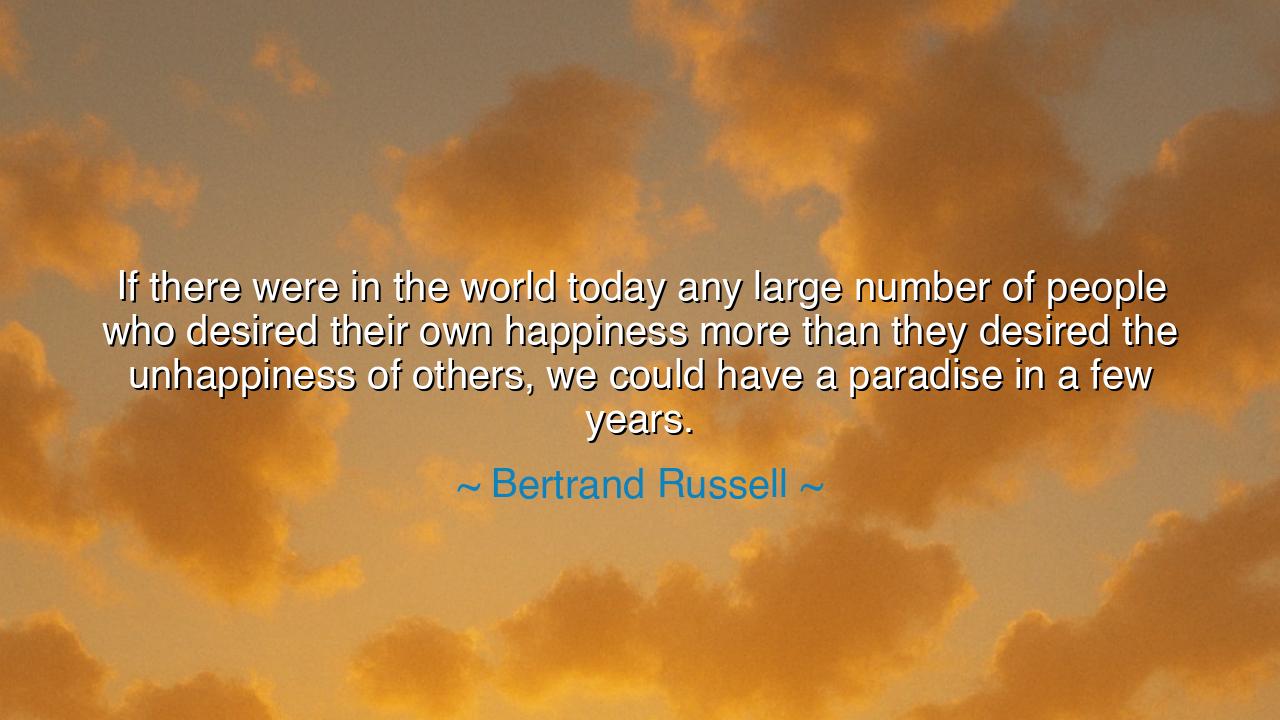
If there were in the world today any large number of people who
If there were in the world today any large number of people who desired their own happiness more than they desired the unhappiness of others, we could have a paradise in a few years.






The philosopher Bertrand Russell, in his quiet yet piercing wisdom, once said: “If there were in the world today any large number of people who desired their own happiness more than they desired the unhappiness of others, we could have a paradise in a few years.” These words, though simple in their phrasing, shine like a mirror held before the heart of humankind. They ask us not merely to wish for peace, but to look within and see what dark joy we take in the misery of others. For what Russell spoke of was not politics, nor philosophy alone, but the ancient struggle between envy and benevolence, between the love of one’s own happiness and the hatred of another’s fortune.
From the dawn of time, the hearts of men have been divided. One part seeks light—the happiness that comes from peace, understanding, and kindness. The other part thirsts for shadow—the bitter satisfaction of seeing another fall. To desire one’s own happiness is divine; it builds, heals, and uplifts. But to desire the unhappiness of others is poison—it corrodes the soul, weakens the will, and makes paradise impossible. For no heaven can be built upon resentment, nor can joy blossom in the soil of hatred. Humanity’s greatest tragedy has never been its ignorance, but its envy.
In the ancient lands of Greece, there was once a tale of Milo of Croton, a man so strong that he could lift an ox upon his shoulders. But one day, another man, jealous of Milo’s fame, plotted his downfall. Instead of training to surpass him, he sought to humiliate him. And so, while Milo grew greater through effort, the envious man grew weaker through hatred. In time, Milo triumphed again—not only in strength but in spirit. The lesson is old as the hills: hatred wastes the hater, while joy enriches the joyful. To rise by love is to build the self; to rise by hatred is to destroy it.
Russell’s truth is not confined to the past—it breathes even now in every corner of our age. Look around: many cry for justice, yet in their hearts, they hunger not for peace, but for vengeance. Many speak of equality, yet they find more pleasure in the fall of the mighty than in the lifting of the poor. If men and women desired truly their own happiness, they would not burn with envy, nor rejoice in ruin. For happiness, rightly sought, can never come through another’s pain. It is a flame that feeds on goodwill, not malice.
The ancients taught that the gods dwell where harmony reigns, and that the divine spirit flees from those who sow discord. So it is with our own hearts. A man cannot hold both hatred and happiness within him; one must drive the other out. To desire the unhappiness of others is to drink salt water—it never quenches, only deepens the thirst. But to desire happiness—one’s own and that of others—is to draw from a living spring, pure and renewing. The wise, therefore, do not compete with others in sorrow but in joy; they seek not to outdo in suffering but in goodness.
Think of Mahatma Gandhi, who faced his enemies with gentleness, not vengeance. He was beaten, imprisoned, mocked—yet he desired not the unhappiness of those who wronged him. He desired peace, for himself and for them alike. In that restraint, in that compassion, he proved stronger than empires. For though the British held India with steel and guns, Gandhi held them with the unyielding power of love. Such love, born from the desire for true happiness, remade nations. It showed that paradise begins not with conquest, but with the quiet transformation of the heart.
And so, my children of tomorrow, take heed: if you wish to see heaven upon earth, do not look to kings or laws, but to your own heart. Let your joy not depend on the sorrow of others. Do not rejoice when your rival fails; rejoice when you yourself grow wiser, kinder, freer. When anger whispers, “Let them suffer,” answer, “Let me heal.” When envy murmurs, “Why not me?” answer, “Let all be blessed.” For if even a few among us live thus—with hearts desiring happiness over hatred, peace over revenge, light over shadow—then paradise shall not be a distant dream, but a dawning reality.
Thus remember, as Russell taught: the world changes not through might, but through the courage to love happiness itself. Begin with your own heart, and paradise shall spread outward—first to your home, then your city, then the world. This is not an idle hope; it is the destiny of all who choose joy over jealousy, compassion over cruelty. For the man who rejoices in another’s light carries the sun within himself, and where he walks, the shadows flee.






AAdministratorAdministrator
Welcome, honored guests. Please leave a comment, we will respond soon